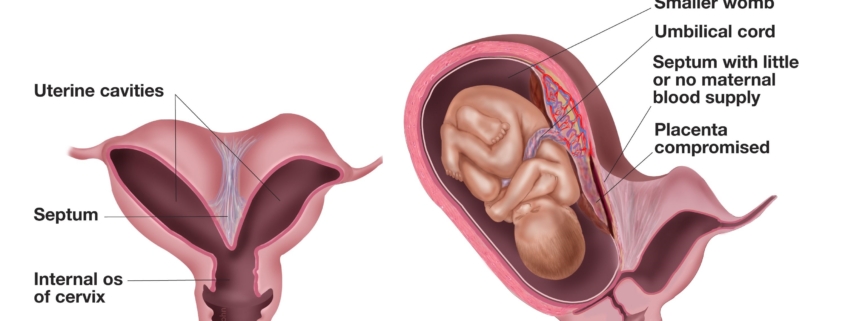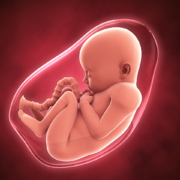What is a Septate Uterus?
Septate uterus is the most common congenital uterine malformation, affecting 1 percent of all women, which happens during fetal development before birth. A membrane called the septum divides the inner portion of the uterus, at its middle. This dividing septum is a fibrous and muscular band of tissue that can be thick or thin.
It’s possible for a septate uterus to be misdiagnosed as a bicornuate uterus. A bicornuate uterus has a heart shape. In this condition, the top portion of the uterus, or fundus, dips in towards the midline of the uterus. This dip can range from shallow to deep. A bicornuate uterus does not typically affect a woman’s chances of successful pregnancies unless the dip is extreme. There are also rare cases of a bicornuate uterus and a septate uterus occurring together.
How does a Septate Uterus affect pregnancy?
Women can have a normal reproductive life, but complications may arise during pregnancy.. The rate of miscarriage in the general population is around 10 to 20 percent in women who know they are pregnant. The estimated rate of miscarriage in women with septate uteris is between 20 to 25 percent. Some research shows it may be as high as forty percent.
It is believed to be the most common type of abnormal uterine development, with estimates suggesting that over half of developmental problems of the uterus involve a septum.
Women with a septate uterus have an increased risk of both miscarriage and recurrent miscarriage. Pregnancies that occur within a uterus with any type of abnormal development increase the risk for:
- Premature labor
- Breech Positions
- C-Section Delivery
- Bleeding complications after delivery
What are the symptoms?
- unusual pain before or during a menstrual period.
- a tampon may not prevent menstrual blood from leaking out.
What causes septate uterus?
- A septate uterus forms during embryological development when the tubes that eventually become one uterus don’t fuse together properly.
- Septate uterus is a genetic abnormality.
Does this symptom affect sexual and reproductive life?
- It does not affect a woman’s sexual pleasure or fertility.
- Women with a septate uterus can have a normal reproductive life, but it may add complications to pregnancy.
Diagnosis?
A septate uterus often remains undiagnosed until a woman experiences repeated miscarriage. At other times, the doctor may stumble upon it during a routine physical exam. This is because a septate uterus is often accompanied by similar malformations of the cervix and vagina. Typically referred to as a “double cervix” and “double vagina,” these are often the first clues of a similar abnormality in the uterus.
A standard 2-D pelvic ultrasound may reveal a septate uterus. An MRI can be a more accurate way to identify problems of the uterus. A definitive diagnosis may be required on a hysterosalpingogram (an X-ray procedure highlighting the uterus) and/or hysteroscopy (a visual examination using a lighted scope). Even with these examinations, a septate uterus can sometimes be misdiagnosed as a bicornuate uterus, also known as a “heart-shaped uterus.” While the malformation is by no means considered normal, it does not typically increase the risk of miscarriage.
Treatment
Most commonly, treatment involves surgery to remove the septum during a hysteroscopy. This is a fairly minor procedure usually performed on an outpatient basis. The surgery, called metroplasty, is minimally invasive and involves the insertion of a medical device through the cervix and into the uterus to cut away excess tissue.
This usually takes between 30 and 60 minutes to perform. Afterward, healthcare providers may prescribe antibiotics and estrogen to prevent infection and aid in healing. Hysteroscopic metroplasty can improve chances of a successful pregnancy in women with recurrent pregnancy by 53.5 percent, according to a comprehensive analysis of 29 studies conducted from 1986 to 2011.
Disclaimer
The information, including but not limited to, text, graphics, images and other material contained on this website are for informational purposes only. The purpose of this website is to promote broad consumer understanding and knowledge of various health topics. It is not a substitute for professional medical advice, diagnosis, or treatment. Always seek the advice of your physician or another qualified healthcare provider with any questions you may have regarding a medical condition or treatment before undertaking a new health care regimen, and never disregard professional medical advice or delay in seeking it because of something you have read on this website.
Resources:
https://www.webmd.com/baby/septate-uterus
https://www.healthline.com/health/septate-uterus#septate-uterus-and-pregnancy







 ToronTek
ToronTek 



Leave a Reply
Want to join the discussion?Feel free to contribute!